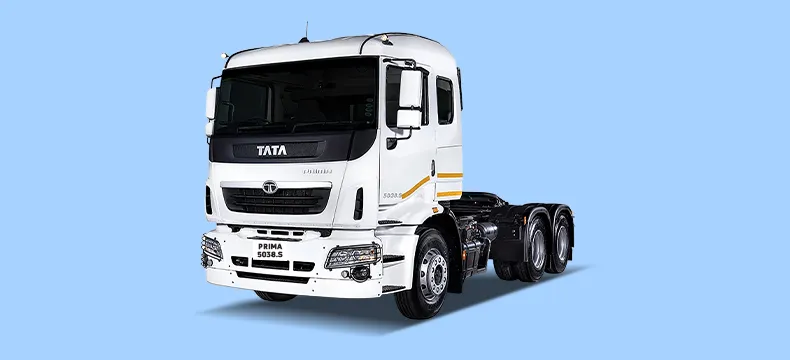4 Dec 2025

How To Start Farming Business in Kenya?
- Tata Motors
- 20 May 2025
- COMMERCIAL VEHICLE
Introduction
Starting a farming venture in Kenya presents a great opportunity, thanks to the country's favourable climate and fertile soil. These natural advantages contribute to high-quality produce and strong market demand, making agriculture a potentially profitable and sustainable business.
This guide outlines an overview of how to start farming in Kenya and essential factors to consider before beginning your agricultural journey.
How To Start Farming in Kenya?
Simple steps to start farming in Kenya:
-
Choose the Right Crop
Selecting the right crops is the first step toward a successful farming venture. Consider these two key factors when making your decision:
- Suitability to Kenya’s Climate
Research the most commonly grown crops to identify those that thrive in the local soil and weather conditions.
- Profitability
Evaluate the most financially rewarding crops to determine which options offer the highest returns.
Cross-referencing both aspects will help you make an informed decision about which crops to cultivate.
- Suitability to Kenya’s Climate
-
Choose a Suitable Farmland
Selecting suitable land for farming is important as it directly impacts farming techniques, crop growth rate, and overall quality. Farming lands vary across the country, with the soil type being the primary differentiator.
Choose land with soil well-suited to your chosen type of farming. In addition to soil suitability, the land should have reliable water sources and be close to markets and distribution channels for streamlined operations.
-
Develop a Farming Plan
A well-structured plan ensures efficiency and productivity. Key aspects include:
- Planting Strategy
Decide the quantity of seeds to plant and maintain proper spacing for healthy growth.
- Growth Cycle Management
Time fertilisation, irrigation, and harvesting to optimise crop yield.
- Financial Planning
Estimate costs, potential revenue, and investment need to manage finances effectively.
- Planting Strategy
-
Gather Essential Farming Resources
To kickstart your farm, you’ll need:
- Quality Seeds and Fertilisers
These directly impact crop growth and yield.
- Infrastructure
Storage facilities are crucial for preserving seeds and harvested produce.
- Skilled Labour
Hiring experienced farmworkers can improve productivity and ensure effective farming techniques.
- Quality Seeds and Fertilisers
-
Be Patient and Adaptable
Farming is a gradual process. You need to dedicate a reasonable amount of time to it. This is because the soil must first acclimate to cultivation. Then, the seeds also need to settle in and grow in the soil. This may span months or even a year. Therefore, when starting a small farming business, being patient is important.
Additionally, you should be prepared for the unpredictable. This is true as farming relies heavily on natural factors like sunlight, water, and air. Any disruptions in these factors can negatively impact the crop’s growth and overall quality.
Factors to Consider Before Starting a Farming Business in Kenya
Common factors to consider before venturing into your farming business ideas in Kenya:
-
Soil fertility
Soil fertility directly influences your crop's growth and quality. Every agricultural land has a different type of soil fertility. Choose agricultural land with soil fertility suited to the type of farming you plan to pursue. This will support your crop cultivation, ensuring the seeds you sow lead to successful harvests.
-
Water availability
Regardless of the types of farming you are pursuing, water availability is paramount. This helps you implement a proper irrigation system to sustain your farming activities long-term. The available water should be clean and free from hardness to prevent crop damage.
-
Regulatory compliance
Regulatory compliance is an uncompromisable factor to consider when venturing into your farming business ideas in Kenya. Ensure you complete agricultural licensing, secure land ownership or lease agreements, conduct environmental impact assessments, and adhere to health and safety standards.
Conclusion
Farming in Kenya offers both financial rewards and personal fulfilment, given the country's rich agricultural resources. By following this farming startup guide, selecting suitable land, and planning strategically, you can establish a successful farm.
If you are planning to start farming in Kenya, commercial vehicles are essential for the efficient storage and transportation of produce. It is advisable to incorporate them into your operations to enhance overall efficiency. Tata Motors commercial vehicles stand out as an excellent choice, offering superior functionality and value for money.
FAQs
-
What is the most profitable farming business in Kenya?
Common profitable farming business ideas in Kenya are tomatoes, peppers, rosemary, beekeeping, dairy, and poultry farming.
-
How much capital is needed to start a small farm?
The capital requirements vary depending on the region in Kenya and the types of farming you are pursuing. Consulting an agricultural and financial specialist can help you with financial planning for farming.
-
What are the best crops for beginners?
Maise and Sukuma (Kale) are popular crops for beginners to grow.
- Tags



















